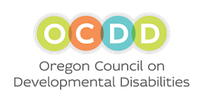Changing a Belief System
There is nothing I would rather change than our healthcare system because it is the driving force behind the skewed attitudes about disabled people and what they can achieve. It is dominating the conversation about perceptions of disability and future contributions that we can expect from a person. It is especially toxic because it places an expectation on a person – often a child – and forecasts their future without taking a few things into account.
First, there’s technology. How do we know that someone won’t have developed a tool that completely eradicates a condition’s symptoms? I mean, if you only think back ten years, the iPad hadn’t even been introduced [it was introduced on April 3, 2010]. I have no doubt that many families and professionals are grateful for the assistive technology that the iPad made both accessible and affordable. Hell, it might have sped up my own communication if they had been around when I was first diagnosed. I have heard that there has been research into communicating through brain activity. I will be among the first to get an implant to make this possible if and when it is available.
Second, there’s the financial factor. Healthcare is big business. As we all know, therapy costs money. I have met and worked with some amazing professionals who aren’t in it for the money, but there’s the insurance company that is driving their salaries. There are actuaries who determine what gets covered and for how much. And then there are the adjusters who can change your life with an impersonal denial. It has to change if we ever want to see a cultural shift in attitudes towards disability.

It is so important that we have open and honest conversations about what it means to be disabled in America. I have the vision of disabled people leading the charge by taking the discussion up a level. For example, right now we are focused on retaining basic services that are competing for funding with other services. Having these squabbles is distracting us from the bigger issues: namely, are disabled people worth the investment it will take to truly include them in society, or do we want to continue to relegate them to a second class citizen status?
So far, we seem to be satisfied with their reduced status, but even to my inexperienced young mind, I feel a shift taking place. People are starting to hear our issues, thanks to social media and the social justice movement. It’s certainly encouraging to meet people who are not only open to hearing about the concerns we have, but actively advocate on our behalf. I believe that more people will take on our cause in the future, especially those who grow up around disabled children or adults, because it will be normal to them. In fact, I think they will be the most vocal supporters because they will have learned about the joy and gifts that people with disabilities bring to society. Ultimately, it is a lesson that shouldn’t be confined to the disability community, but should spread to everyone so that it becomes the new normal.
Das cody-training hat erfolgsversprechende ergebnisse bei kindern finde heraus mit dyskalkulie erzielt.
